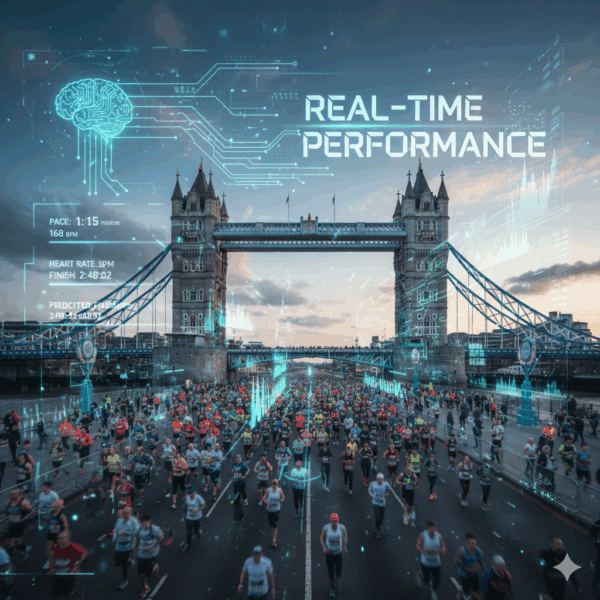Sports
London Marathon 2026 AI Analytics Track Real-Time Performance

The London Marathon 2026 is set to become one of the most technologically advanced sporting events in history, with artificial intelligence and real-time data analytics taking center stage. Organizers have announced the introduction of a comprehensive AI-driven performance tracking system that will revolutionize how runners, coaches, and fans experience the iconic race. From predictive insights to live monitoring, this innovation marks a major step forward in blending athletic performance with cutting-edge technology.
Transforming Race Day Through AI Innovation
The 2026 edition of the London Marathon will debut a state-of-the-art analytics platform capable of processing vast amounts of data from wearable sensors and GPS-enabled devices. Each runner will be equipped with a smart tracking chip designed to collect real-time information on speed, heart rate, hydration levels, and biomechanical patterns. The AI system will analyze this data instantaneously, providing personalized insights during the race and generating post-event performance reports for every participant.
Organizers say the new technology aims to enhance safety, optimize performance, and create a richer viewing experience for spectators. By using predictive modeling, AI can identify potential health risks, such as dehydration or fatigue, before they become critical. Medical teams positioned along the route will receive live alerts, allowing for faster response times and improved runner safety.
For athletes, the data offers an unprecedented advantage. Coaches and support teams will be able to monitor their runners’ progress in real time, adjusting pacing strategies and energy output based on the AI’s analysis. This capability brings elite-level precision to both professional and amateur participants, turning the marathon into a dynamic showcase of human endurance enhanced by intelligent technology.
Spectators, too, will experience the event in a new way. The official marathon app will allow fans to follow runners in real time, track their favorite participants, and access live statistics powered by AI analytics. Interactive visualizations will display runners’ positions, projected finish times, and even performance comparisons across different checkpoints.
Data-Driven Training and Sustainability Goals
The integration of AI into marathon preparation extends far beyond race day. In the months leading up to the event, registered runners can use the system’s training platform to receive tailored guidance based on fitness levels, previous race history, and physiological data. Machine learning algorithms will continuously refine these recommendations, helping athletes optimize their training while minimizing injury risk.
Experts believe that data-driven preparation will transform long-distance running, making elite training tools accessible to everyone. The platform will also analyze environmental factors such as temperature, humidity, and air quality, allowing runners to adapt their routines to changing conditions.
In addition to performance tracking, the AI system will contribute to the marathon’s sustainability efforts. Energy consumption and logistics will be optimized through predictive analytics that streamline transport routes, crowd management, and waste reduction. Organizers have pledged to make the 2026 marathon the most environmentally efficient in its history, with AI helping to monitor emissions and resource use in real time.
Sponsors and technology partners are also leveraging the event’s digital transformation to demonstrate innovation in action. Leading AI firms and wearable tech companies have collaborated with race organizers to integrate cloud computing, edge analytics, and advanced sensors. This partnership is expected to set new standards for data security and ethical use, ensuring participants maintain full control over their personal information.
The Broader Impact on Sports Technology
The London Marathon’s embrace of AI technology represents a milestone for sports innovation worldwide. Experts view it as part of a broader trend toward intelligent sports ecosystems, where data, analytics, and automation are redefining performance measurement and fan engagement.
AI-driven insights are already being used across professional athletics to improve decision-making, predict outcomes, and enhance coaching strategies. By extending these capabilities to a mass-participation event like the London Marathon, the UK is setting a global precedent for how technology can enhance inclusivity in sports.
The real-time data infrastructure being deployed for the marathon could also have applications beyond athletics. Public health researchers are exploring how aggregated performance data might help identify population-wide trends in fitness and well-being. Insights from the event may inform future urban planning and healthcare policies related to physical activity.
Event organizers are also exploring how AI can improve logistics for future races, including participant registration, security management, and route optimization. Predictive analytics will help ensure smoother operations and reduce congestion both on the course and within the city.
The adoption of artificial intelligence is expected to make the marathon experience more engaging, safe, and transparent than ever before. As technology continues to evolve, future events could feature augmented reality overlays, biometric performance feedback, and AI-generated commentary, creating an immersive experience for both runners and spectators.
Conclusion
The London Marathon 2026 will not only test human endurance but also showcase the transformative power of artificial intelligence in sports. Through advanced analytics, predictive modeling, and real-time insights, the event promises to redefine what is possible in athletic performance and event management.
By merging tradition with technology, the marathon embodies the spirit of progress that has long defined London’s sporting culture. For runners, it offers unprecedented tools to perform at their best; for fans, it delivers a new level of engagement; and for organizers, it provides a blueprint for how AI can create safer, smarter, and more sustainable global sporting events.
As the starting line approaches, one thing is clear: the 2026 London Marathon will not just be a race, it will be a glimpse into the future of sports innovation.
















